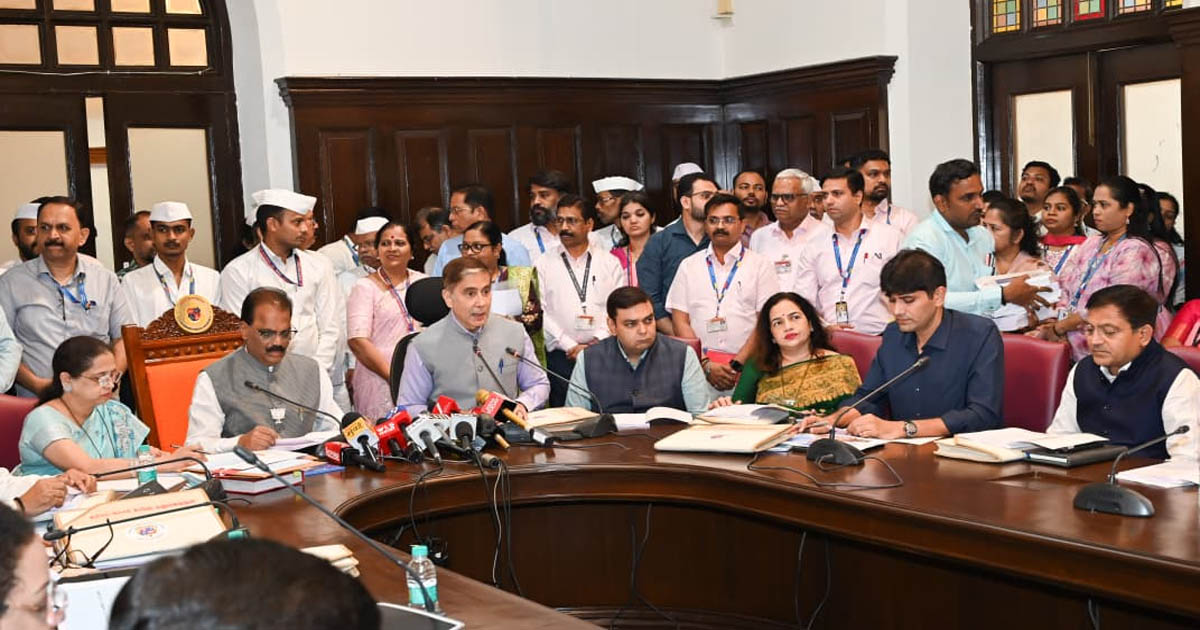General
Scientists develop mechanism to inactivate Covid by blocking entry to cells

Scientists have developed a design of a new class of synthetic peptides that can not only block the entry of SARS-CoV-2 virus entry into cells but also clump the virions (virus particles) together, reducing their ability to infect.
Scientists at the Indian Institute of Science (IISc), in collaboration with researchers from the CSIR-Institute of Microbial Technology, have made use of this approach to design peptides that can bind to and block the spike protein on the surface of SARS-CoV-2 virus, said the Ministry of Science and Technology on Wednesday.
This binding was further characterised extensively by cryo-electron microscopy (cryo-EM) and other biophysical methods. This novel approach provides an alternative mechanism to render viruses like SARS-CoV-2 inactive, promising a new class of peptides as antivirals.
The research was supported under the Covid-19 IRPHA call of SERB Science and Engineering Research Board (SERB), a statutory body of Department of Science and Technology (DST).
The designed peptides are helical, hairpin-shaped, each capable of pairing up with another of its kind, forming what is known as a dimer. Each dimeric ‘bundle’ presents two ‘faces’ to interact with two target molecules.
In the study published in Nature Chemical Biology, the researchers hypothesised that the two faces would bind to two separate target proteins locking all four in a complex and blocking the targets’ action. The team decided to test their hypothesis by using a peptide called SIH-5 to target the interaction between the Spike (S) protein of SARS-CoV-2 and ACE2 protein, the SARS-CoV-2 receptor in human cells.
The S protein is a trimer – a complex of three identical polypeptides. Each polypeptide contains a Receptor Binding Domain (RBD) that binds to the ACE2 receptor on the host cell surface. This interaction facilitates viral entry into the cell.
The SIH-5 peptide was designed to block the binding of the RBD to human ACE2. When a SIH-5 dimer encountered an S protein, one of its faces bound tightly to one of the three RBDs on the S protein trimer, and the other face bound to an RBD from a different S protein.
This ‘cross-linking’ allowed the SIH-5 to block both S proteins at the same time. Under cryo-EM, the S proteins targeted by SIH-5 appeared to be attached head-to-head, and the spike proteins were being forced to form dimers.
Subsequently, the researchers showed that SIH-5 inactivated the viruses efficiently by cross-linking the spike proteins from different virus particles.
The team consisting of B Khatri, I Pramanick, SK Malladi, RS Rajmani, P Ghosh, N Sengupta, R Varadarajan, S Dutta and J Chatterjee from Indian Institute of Science (IISc), R Rahisuddin, S Kumar, N Kumar, S Kumaran and RP Ringe from CSIR-Institute of Microbial Technology, tested the peptide for toxicity in mammalian cells in the lab and found it to be safe.
When hamsters were dosed with the peptide and subsequently exposed to a high dose of SARS-CoV-2, they showed decreased viral load as well as much less cell damage in the lungs compared to hamsters exposed only to the virus, demonstrating the promise of this class of peptides as antivirals.
The researchers believe that with minor modifications and peptide engineering, this lab-made miniprotein could inhibit other protein-protein interactions as well.
Maharashtra
Abu Asim response to Nitesh Rane’s statement that madrasas are the base of terrorism: Rane is a liar

Mumbai: Maharashtra Minister Nitesh Rane, while demanding a ban on madrasas, called them a haven for terrorism and showed hostility towards Muslims, on which Maharashtra Samajwadi Party leader and MLA Abu Asim has called Nitesh Rane a liar. He said that Nitesh Rane is lying about madrasas. No training for terrorism is given in madrasas in our country. This is the brainchild of Nitesh Rane. If there is any doubt, then madrasas should be monitored 24 hours a day with cameras. Defaming madrasas is just part of divisive politics. The fact is that madrasas educate orphans and poor children and make them good human beings. If we look at history, the students of these same madrasas sacrificed their lives for the country’s freedom. The purpose of madrasas has always been to serve humanity. BJP’s politics is now limited to Muslims, mosques, prayers and madrasas. He said that the way BJP and Nitesh Rane are conspiring to defame madrasas, they can never succeed in their goal because this madrasa is not your lair, but the people are made from the soil of this place. Politics is involved in all the allegations made against madrasas and that is why there is no need to pay attention to Nitesh Rane’s words, his job is to spread poison and divide Hindus into Muslims.
Maharashtra
Mumbai Municipal Corporation presents budget with deficit of Rs 80,952.56 crore for 2026-27, 8.77% increase in expenditure over last year’s estimate

Mumbai: Municipal Corporation (BMC) has presented its deficit budget for the current financial year. It has presented a budget of Rs 80,952.56 crore for the financial year 2026-27, against an estimate of Rs 89.84 crore. Municipal Commissioner Bhushan Gagrani presented the budget along with Standing Committee Chairman Prabhakar Shinde.
The new expenditure is higher than the previous year’s budget of Rs 74,427.41 crore. The civic body said it has adopted a policy of reducing administrative expenditure and has made strong arrangements for development works.
The corporation currently has Rs 81,449 crore and 32 lakh crore. Of this amount, Rs 44,826 crore and 23 lakh crore are earmarked deposits and cannot be used. The remaining amount of Rs 36,623 crore and 09 lakh crore can be used for other civic projects.
Officials said the corporation may break some deposits to fund infrastructure and development initiatives.
A key policy decision in the budget relates to outdoor advertising. The civic body has imposed a complete ban on billboards larger than 40 by 40 feet. It will also not allow billboards on footpaths or building roofs. No new approvals will be given for such structures. The move is aimed at improving public safety and curbing dangerous hoardings.
The budget has provided Rs 5,237 crore for the health department for 2026-27. The civic body also said that 1.35 crore citizens have availed services at the Hindu Hardai Samrat Balasaheb Thackeray Hospital. It plans to introduce free AI-based treatment for diabetes and eye diseases at the hospital.
To tackle the rising air pollution in the city, the corporation has allocated Rs 159.82 crore for environment and cleanliness. The budget includes Rs 1,000 crore as grant to BEST. The education department has been allocated Rs 4,248.8 crore. Solid waste management gets Rs 580.82 crore, while the storm water drainage department gets Rs 1,800 crore.
The allocation for infrastructure is Rs 6,875 crore for roads and transport, Rs 9,650 crore for bridges, Rs 950 crore for coastal road project, Rs 1,330 crore for water engineering and Rs 6,600 crore for sewerage project works. Rs 800 crore has been allocated for parks and zoos. The budget emphasizes administrative expenditure for infrastructure development.
Maharashtra
Mumbai: Ajit Pawar plane crash, Marine Drive police station refuses to register case against MLAs

Mumbai: Police has refused to register a case in the Ajit Pawar plane crash case. NCP leader MLA Rohit Pawar along with other MLAs had today gone to Marine Drive police station and demanded that a case be registered in the Ajit Pawar plane crash or conspiracy case. The process of recording his confession statement was also going on, but in the meantime, the DCP and Additional Police Commissioner refused to register a case and said that a case cannot be registered in this matter. Expressing his displeasure, Rohit Pawar said that the purpose of registering an FIR today is that the DGCA has issued a circular on the basis of which action has been taken regarding the VSR company, on this basis the VSR company is responsible for this plane crash, yet the police have refused to register a case. He said that any citizen can register a complaint at the police station, this act says, but contrary to this, the police have refused to register a case. He said that efforts are underway to save the VSR company. He said that the police register cases for other crimes including assault, but why is the police not registering a case on the incident that happened with a Maratha leader and Deputy Chief Minister Ajit Pawar? This is completely wrong. Our struggle will continue until justice is achieved. He said that tomorrow morning we will try to register a complaint at the Baramati police station. Rohit Pawar expressed his disappointment and said that if a Deputy Chief Minister does not get justice, then what will happen to the common man? Regarding the registration of a case in the case of Deputy Chief Minister Ajit Pawar, the ruling party BJP has also taken its stand that a case should not be registered in this matter, while it has also recommended a CBI inquiry into this matter, but despite this inquiry, we have the right to register an FIR, yet we are being deprived of it and have refused to take an FIR.
-

 Crime4 years ago
Crime4 years agoClass 10 student jumps to death in Jaipur
-

 Maharashtra1 year ago
Maharashtra1 year agoMumbai Local Train Update: Central Railway’s New Timetable Comes Into Effect; Check Full List Of Revised Timings & Stations
-

 Maharashtra1 year ago
Maharashtra1 year agoMumbai To Go Toll-Free Tonight! Maharashtra Govt Announces Complete Toll Waiver For Light Motor Vehicles At All 5 Entry Points Of City
-

 Maharashtra1 year ago
Maharashtra1 year agoFalse photo of Imtiaz Jaleel’s rally, exposing the fooling conspiracy
-

 National News1 year ago
National News1 year agoMinistry of Railways rolls out Special Drive 4.0 with focus on digitisation, cleanliness, inclusiveness and grievance redressal
-

 Maharashtra1 year ago
Maharashtra1 year agoMaharashtra Elections 2024: Mumbai Metro & BEST Services Extended Till Midnight On Voting Day
-

 National News1 year ago
National News1 year agoJ&K: 4 Jawans Killed, 28 Injured After Bus Carrying BSF Personnel For Poll Duty Falls Into Gorge In Budgam; Terrifying Visuals Surface
-

 Crime1 year ago
Crime1 year agoBaba Siddique Murder: Mumbai Police Unable To Get Lawrence Bishnoi Custody Due To Home Ministry Order, Says Report












